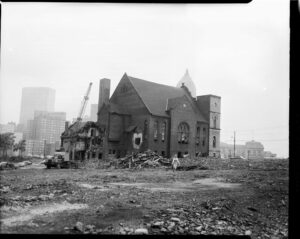
When a historic Black church in the Hill District of Pittsburgh reached an agreement in 2023 with the Pittsburgh Penguins to reclaim land that it had been forced to give up more than 60 years ago, Lutherans were a part of the faith community supporting the effort.
Bethel African Methodist Episcopal Church is reclaiming a 1.5-acre parcel near its former home and planning to use the site for a housing project and other revenue-generating development.
The road to reparations was a long one, and the support of the Lutheran community in southwestern Pennsylvania was itself rooted in tragedy — the racist massacre of nine people at a Bible study at Mother Emanuel AME Church in Charleston, South Carolina in 2015.
The Rev. Kurt Kusserow, bishop of the Southwestern Pennsylvania Synod, said a visit to Mother Emanuel with other ELCA bishops led each of the bishops to pledge to the pastors at Mother Emanuel that they would work to build relationships with the AME in their synods.
“This story has roots that go back quite a way, in that our church was grieved to learn that Dylann Roof, who came to Mother Emanuel and shot nine people, was an ELCA confirmed member,” Kusserow said. “In our church, it created an active and intentional effort to build personal relationships with the AME church as an effort to overcome that system — that gap — between members of our church and members of the AME just because of our race difference.”
Roof, a white supremacist who was 21 at the time of the shooting, was convicted of federal hate crime and murder charges and sentenced to death. He also pleaded guilty to murder charges in state court and was sentenced to life in prison with no possibility of parole.
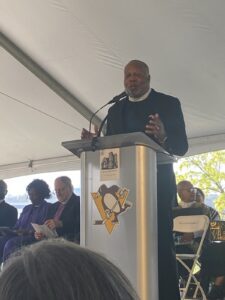
The Rev. Dr. Dale Snyder addressing the crowds at the rededication site for the future development of Bethel.
When Lutherans in Pittsburgh reached out to members of AME churches through local ecumenical groups, they eventually connected with the Rev. Dale Snyder, who was then the new pastor at Bethel.
The Rev. Erin Jones, an ELCA pastor of a Presbyterian and Methodist congregation in Pittsburgh at the time, said when members of the SWPA Synod’s ecumenical affairs committee began reaching out to AME pastors in the fall of 2019, Snyder had just started at Bethel AME. “He didn’t have friends yet in Pittsburgh, so he decided he’d make friends with the Lutherans.”
Jones, who now serves as LAMPa’s communications and advocacy engagement manager, said Snyder had just learned the history of Bethel’s loss of its church and property as the result of a 1950s urban renewal project, and he shared that history with his new Lutheran friends.
Pittsburgh’s Hill District, east of the city’s central business district, was by the 1950s a hub for Black culture, renowned for its jazz clubs and other cultural touchstones.
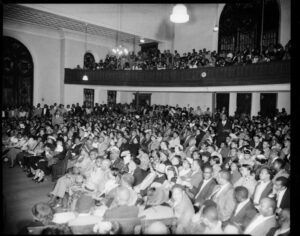
A gathering for racial justice at Bethel AME in the 1950s. Bethel was not just a church, but at the center of justice and action in the Hill District.
Bethel AME, founded around 1808 and considered Pittsburgh’s oldest Black church, was active from its earliest years in childhood education and civil rights. It opened a large brick church in 1906 in the Lower Hill District, with rounded arches and a prominent tower, and had about 3,000 members at its peak.
But in the 1950s, the Urban Redevelopment Authority of Pittsburgh declared much of the Lower Hill to be blighted. It oversaw demolition of about 1,300 buildings across 95 acres, displacing over 8,000 people, more than 400 business and multiple houses of worship. Bethel leaders fought the church’s demolition unsuccessfully, ultimately receiving $240,000 for a property that had been valued at $745,000.
The redevelopment saw construction of a cross-town expressway, civic arena and some housing, but other plans never materialized.
The Pittsburgh Penguins NHL team played in the original arena and then a newer one nearby after the first arena was demolished. Under agreements with public authorities, the Penguins also had development rights to 28 acres of the former arena site. A 26-story mixed-use building is on the rise, and a small urban park has opened, with other projects on the drawing board.
But Kevin Acklin, president of business operations for the Penguins, told the Associated Press at the time land was returned to Bethel AME in the spring of 2023 that the team recognized its role as stewards of the property and its legacy, especially in light of the history of how the property was taken in the 1950s.
“Mistakes that were made 70 years ago, we can’t fix them, but we can do what we can today for a better future, for restorative justice,” Acklin said.
He hopes the agreement, and the larger efforts to remake the site, can serve as a model for other U.S. cities with the wounds of similar mid-20th century urban renewal projects.
“We have the ability to do good and work with a group of people and a church that’s trying to do good,” he told the Associated Press.
Snyder, the pastor of Bethel, said at the time the deal was announced that the church hopes to build between 280 and 350 apartments on the site, along with a childcare facility and commercial space.
“Our goal is to put together a marketable low- to moderate-income development that will allow us to financially be solvent for Bethel — because there’s no need to put together a project that’s going to come out with a zero profitability,” Snyder announced.
Initial blueprints of the development put its total cost at more than $100 million. Any revenue the project generates is expected to financially solidify the congregation’s future.
The agreement to return land to Bethel AME came after years of public calls and demonstrations by the church, which has described its efforts as seeking reparations. The church battle is a microcosm of a larger one regarding the legacy of the 1950s project, in which leaders in the Black community have long sought redress.
Kusserow said that while the SWPA Synod began contacting AME pastors in 2019, it was not until after 2020’s Covid-19 pandemic lockdowns were in place that the group began meeting.
“We met outside and walked around a reservoir,” Kusserow said. “Six to eight of our pastors and six to eight of their pastors showed up and paired up and walked around the reservoir. We talked for an hour… Then we made a big circle and prayed — before God and before everybody.”
Kusserow said a group continued to hold weekly meetings about reparations for Bethel AME. “We considered what could be done about the fact that 70 years ago the building was taken to create the hockey arena.”
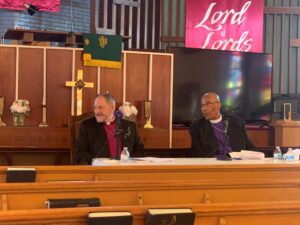
Bishop Kusserow of the SWPA Synod, and Bishop Errenous E. McCloud, Jr. of the Third Episcopal District of the AME, at Bethel commemorating Juneteenth in 2022.
The meetings, he said, gained interest and attention. “Our people and Bethel AME congregation members spent more time with each other, and committed ourselves to anti-racism and the work of reparations. We got to know each other around this issue,” he said. “This issue really galvanized our relationships, until it got to the point where the city of Pittsburgh and the Penguins were talking publicly talking about how reparations could begin with Bethel.”
Kusserow said not only are the reparations important, but so are the deep relationships that have formed.
“The most satisfactory thing is when that kind of thing happens, the deep relationships,” he said. “It’s not just attending one meeting. It’s living together in community as neighbors, members of one family.”
Kusserow said he keeps returning to a question that the spouse of one of the bishops who visited Charleston asked during a meeting with those church members: How do they manage the challenges of being a black church in Charleston. The answer was, “This has been our life for 400 years.”
Kusserow said the work of accompaniment continues, including with the synod’s and city’s annual Martin Luther King Jr. Day celebrations, which will be held this year on Monday, January 15.
“When we see each other at other events — if there is a downtown gathering about the disasters in Ukraine, or because of shootings at synagogues in New Zealand — we come, see each other, and come to greet each other,” he said. “The relationship is centered not just around reparations, but we know each other and we’re together now.”
Jones said members of the synod committee began to talk about reparations with predominantly white church communities in the Pittsburgh area, beginning with the congregation she served at the time, Hot Metal Bridge Faith Community.
Those conversations were based on a book about reparations that Snyder had shared with his ecumenical partners. “Those authors kind of break reparations down into how do we repair the loss and there are many kinds of losses,” Jones said. “There is economic, but also loss of truth, loss of dignity. Even if it’s not economic, we can repair other things that need to be repaired.”
She said the groups started talking about Bethel’s story and how to theologically unpack the idea of reparations.
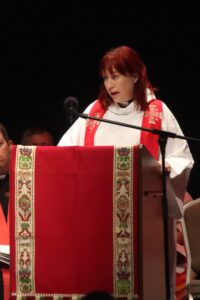
Rev. Erin Jones preaching at SWPA Synod Assembly, reflecting on the relationship with Bethel AME.
“I remember saying as we would present to predominantly white congregations, ‘You probably have a gut reaction to this word reparations. We don’t want to shame you into thinking ‘white people have always been terrible and you have to shell things out of your pocket.’ We do want you to ask yourselves challenging questions like what’s your responsibility to your neighbors now, and how can we offer what we can.’”
Jones said the groups used some of the parables of Jesus in talking about reparations, including the story of the tax collector who names wrongs and does repay money, as well as the story of the Good Samaritan, who sees harm and even though he didn’t cause it, comes alongside the harmed and offers what he can.
“The question was how do we come alongside the Black community and be good allies,” Jones said. “So we did it at 10 different communities throughout Pittsburgh across denominations, and advocated, supported Bethel’s work in talking with the mayor’s office, and the Penguins.”
She said while seeing land returned to Bethel AME and the building project is wonderful, “for me, it’s been proof of how actual reconciliation can be made through these relationships.”





